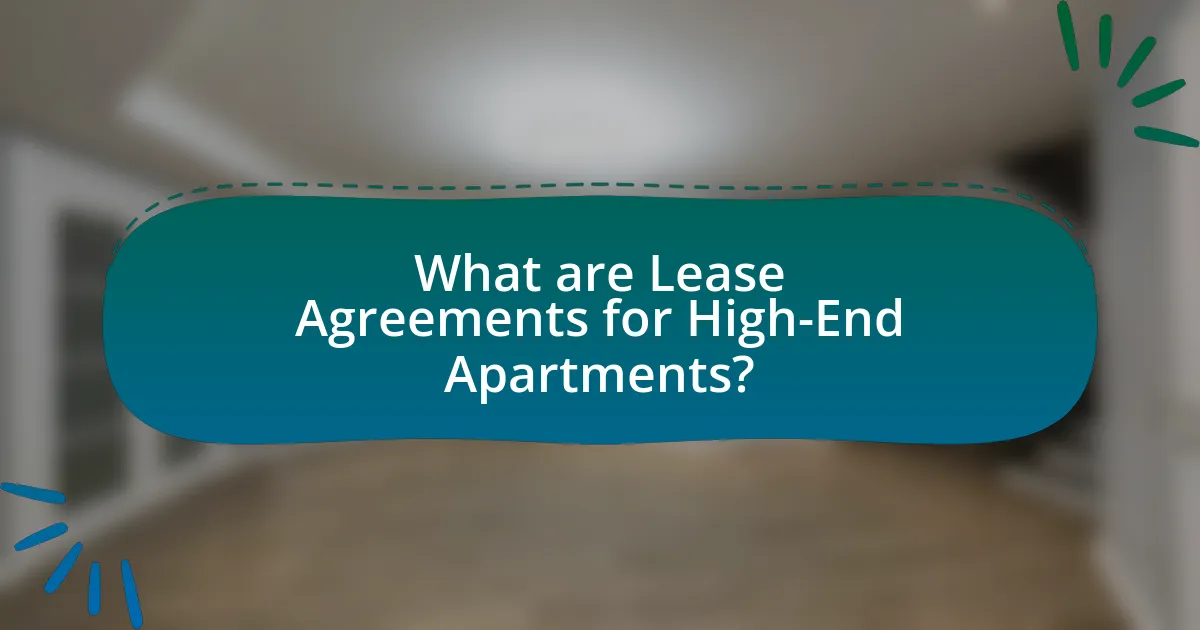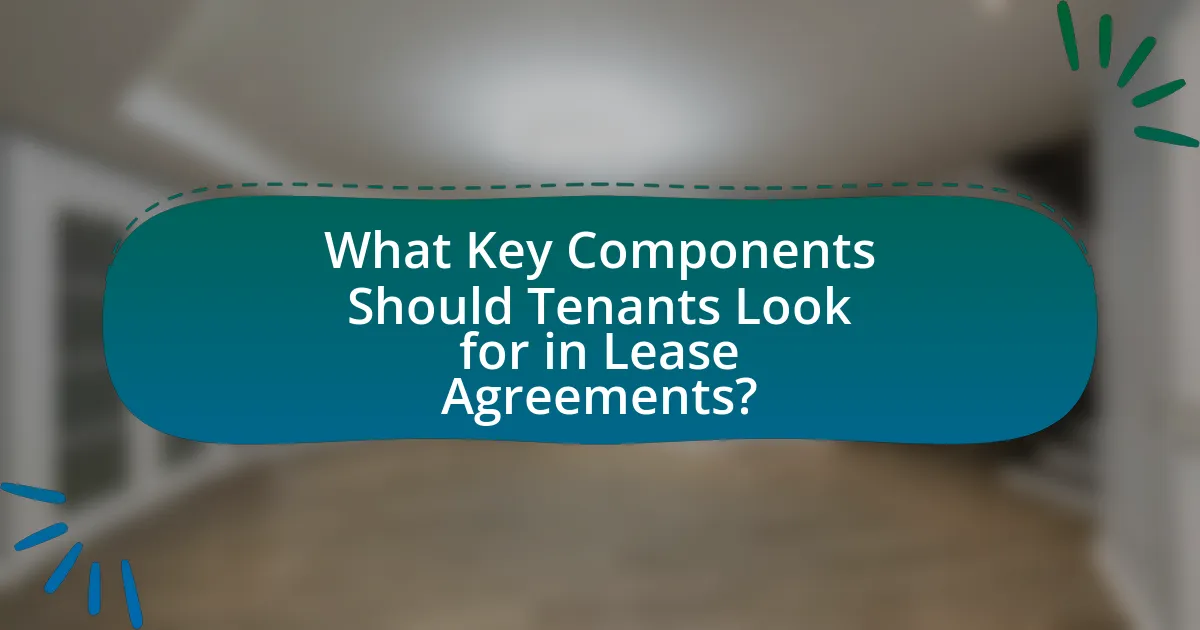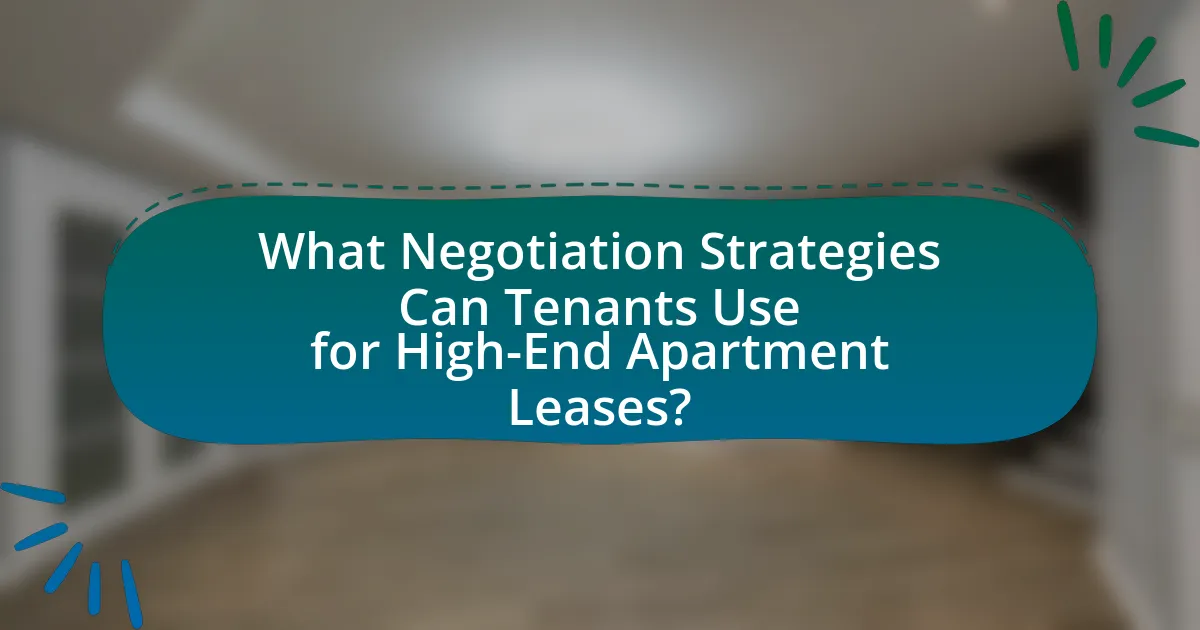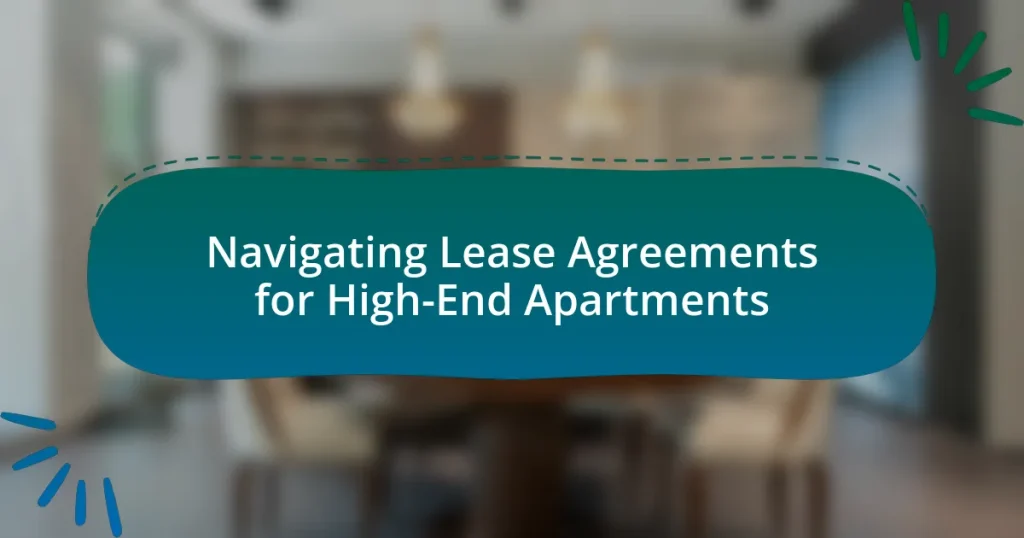Lease agreements for high-end apartments are detailed legal contracts that specify the terms and conditions for renting luxury properties. These agreements typically encompass aspects such as lease duration, rental prices, security deposits, maintenance responsibilities, and rules regarding amenities. Compared to standard rentals, high-end leases often include more stringent clauses related to maintenance, pet policies, and access to exclusive facilities. Understanding these agreements is crucial for tenants to navigate potential pitfalls, protect their rights, and ensure a satisfactory living experience. Key components to consider include lease terms, security deposits, and maintenance responsibilities, all of which significantly impact the rental relationship.

What are Lease Agreements for High-End Apartments?
Lease agreements for high-end apartments are legally binding contracts that outline the terms and conditions under which a tenant can occupy a luxury rental property. These agreements typically include specific details such as the duration of the lease, rental price, security deposit requirements, maintenance responsibilities, and rules regarding the use of common areas and amenities. High-end apartments often feature additional clauses that address unique aspects like pet policies, parking arrangements, and access to exclusive facilities, reflecting the premium nature of the property.
How do lease agreements differ for high-end apartments compared to standard rentals?
Lease agreements for high-end apartments typically include more detailed terms and conditions compared to standard rentals. High-end leases often feature longer lease durations, higher security deposits, and specific clauses regarding maintenance and amenities, reflecting the premium nature of the property. For instance, high-end apartments may require tenants to adhere to stricter rules regarding alterations and use of common areas, while standard rentals generally have more lenient terms. Additionally, high-end leases may include provisions for concierge services or exclusive access to facilities, which are less common in standard rental agreements.
What specific terms are commonly included in high-end apartment lease agreements?
High-end apartment lease agreements commonly include terms such as rent amount, lease duration, security deposit requirements, maintenance responsibilities, and pet policies. These terms are essential for defining the financial and operational expectations between landlords and tenants. For instance, the rent amount specifies the monthly payment, while the lease duration outlines the length of the tenancy, typically ranging from six months to a year. Security deposit requirements often range from one to two months’ rent, ensuring protection against damages. Maintenance responsibilities clarify who is accountable for repairs, often placing the burden on landlords for major issues. Additionally, pet policies may restrict or allow pets with specific conditions, reflecting the luxury nature of the property. These terms are standard in high-end leases to ensure clarity and protect both parties’ interests.
How do luxury amenities influence lease agreements?
Luxury amenities significantly influence lease agreements by allowing landlords to justify higher rental prices and attract affluent tenants. Properties featuring amenities such as fitness centers, pools, and concierge services often command premium rates, as these features enhance the living experience and provide added value. According to a study by the National Apartment Association, apartments with luxury amenities can see rental prices increase by 20% to 30% compared to similar units without such features. This demand for high-end amenities also leads to longer lease terms, as tenants are more likely to commit to a property that meets their lifestyle needs.
Why is understanding lease agreements important for tenants of high-end apartments?
Understanding lease agreements is crucial for tenants of high-end apartments because these documents outline specific terms, conditions, and responsibilities that can significantly impact their living experience. High-end apartments often come with unique amenities, rules, and financial obligations, such as maintenance fees or security deposits, which are detailed in the lease. For instance, a tenant may find clauses regarding pet policies, renovation permissions, or termination conditions that differ from standard leases. By comprehensively understanding these agreements, tenants can avoid potential disputes, ensure compliance with property rules, and protect their financial interests, ultimately leading to a more satisfactory rental experience.
What potential pitfalls should tenants be aware of in lease agreements?
Tenants should be aware of several potential pitfalls in lease agreements, including unclear terms, hidden fees, and restrictive clauses. Unclear terms can lead to misunderstandings about responsibilities, such as maintenance and repairs, which may result in unexpected costs. Hidden fees, such as application fees or maintenance charges, can significantly increase the overall cost of living in a high-end apartment. Restrictive clauses, like those limiting subletting or requiring excessive notice for termination, can limit tenants’ flexibility and rights. Understanding these aspects is crucial for tenants to avoid financial and legal complications.
How can a well-understood lease agreement protect tenants’ rights?
A well-understood lease agreement protects tenants’ rights by clearly outlining the terms and conditions of the rental arrangement, ensuring that both parties are aware of their responsibilities and entitlements. This clarity helps prevent disputes over issues such as rent payment, maintenance obligations, and termination procedures. For instance, a lease that specifies the landlord’s duty to maintain the property and the tenant’s right to a habitable living environment reinforces legal protections under housing laws. Additionally, understanding clauses related to security deposits and eviction processes empowers tenants to assert their rights effectively, reducing the risk of exploitation or unfair treatment.

What Key Components Should Tenants Look for in Lease Agreements?
Tenants should look for several key components in lease agreements, including the lease term, rent amount, security deposit details, maintenance responsibilities, and termination clauses. The lease term specifies the duration of the rental agreement, which can impact tenant stability and planning. The rent amount outlines the monthly payment required, while security deposit details clarify the amount required upfront and conditions for its return. Maintenance responsibilities define who is accountable for repairs and upkeep, which is crucial for property condition. Termination clauses specify the conditions under which either party can end the lease, providing clarity on notice periods and penalties. These components are essential for ensuring that tenants understand their rights and obligations, ultimately leading to a more secure rental experience.
What are the essential clauses in a high-end apartment lease agreement?
The essential clauses in a high-end apartment lease agreement include the lease term, rent amount, security deposit, maintenance responsibilities, and termination conditions. The lease term specifies the duration of the rental agreement, typically ranging from one year to multiple years. The rent amount outlines the monthly payment required, often reflecting the luxury nature of the apartment. The security deposit clause details the amount required to cover potential damages, usually equivalent to one or two months’ rent. Maintenance responsibilities clarify which party is responsible for repairs and upkeep, often placing more obligations on the landlord in high-end properties. Finally, termination conditions define the process for ending the lease, including notice periods and penalties for early termination. These clauses are critical for protecting the rights and responsibilities of both landlords and tenants in high-end rental situations.
How do security deposits and fees differ in high-end leases?
Security deposits and fees in high-end leases typically differ in amount and structure compared to standard leases. High-end leases often require larger security deposits, sometimes equivalent to two months’ rent, reflecting the increased value of the property and potential risk to the landlord. Additionally, high-end leases may include various fees such as amenities fees, maintenance fees, or pet fees, which are less common in standard leases. These fees can significantly increase the overall cost of leasing a high-end apartment, as they are designed to cover the enhanced services and facilities provided. For instance, a study by the National Apartment Association indicates that luxury apartments often have higher operational costs, justifying the additional fees charged to tenants.
What are the implications of lease duration and renewal options?
Lease duration and renewal options significantly impact both tenants and landlords in high-end apartment agreements. A longer lease duration typically provides stability for tenants, ensuring they have a secure living arrangement, while landlords benefit from guaranteed rental income over an extended period. Conversely, shorter leases offer flexibility for tenants to adapt to changing circumstances, but may lead to increased turnover costs for landlords. Renewal options allow tenants to extend their lease under predetermined conditions, which can enhance tenant retention and reduce vacancy rates for landlords. According to a study by the National Apartment Association, properties with favorable renewal options experience a 20% higher tenant retention rate, demonstrating the importance of these terms in lease agreements.
How do maintenance and repair responsibilities affect lease agreements?
Maintenance and repair responsibilities significantly influence lease agreements by delineating the obligations of landlords and tenants regarding property upkeep. These responsibilities are typically outlined in the lease, specifying who is accountable for repairs, maintenance tasks, and associated costs. For instance, if a lease states that the landlord is responsible for major repairs, such as plumbing or electrical issues, it protects tenants from unexpected expenses and ensures that the property remains in good condition. Conversely, if tenants are responsible for minor repairs, such as changing light bulbs or maintaining appliances, it can lead to disputes if expectations are not clearly defined. Clear definitions of these responsibilities in lease agreements help prevent misunderstandings and legal conflicts, thereby fostering a more stable landlord-tenant relationship.
What should tenants know about maintenance requests and response times?
Tenants should know that maintenance requests typically require prompt reporting to the property management or landlord, as timely communication can expedite repairs. Response times for maintenance requests can vary based on the severity of the issue; urgent matters like plumbing leaks may be addressed within hours, while non-urgent requests could take several days. According to the National Apartment Association, 70% of tenants expect maintenance issues to be resolved within 24 hours for urgent requests, highlighting the importance of understanding the expected timelines outlined in lease agreements.
How are repair costs typically handled in high-end leases?
Repair costs in high-end leases are typically handled through a combination of landlord responsibility and tenant obligations, often outlined in the lease agreement. In many cases, landlords cover the costs for major repairs and maintenance, such as structural issues or appliance failures, while tenants are responsible for minor repairs and upkeep, like routine maintenance or damage caused by their actions. This division is designed to ensure that the property remains in excellent condition while also holding tenants accountable for their use of the space. High-end leases often include specific clauses detailing these responsibilities, providing clarity and reducing disputes over repair costs.

What Negotiation Strategies Can Tenants Use for High-End Apartment Leases?
Tenants can employ several effective negotiation strategies for high-end apartment leases, including research on comparable properties, leveraging market conditions, and offering longer lease terms. Conducting thorough research allows tenants to understand the rental market and identify competitive rates, which can be used as leverage during negotiations. For instance, if similar high-end apartments are listed at lower prices, tenants can present this data to negotiate a better deal. Additionally, if the rental market is currently favoring tenants due to high vacancy rates, this can strengthen their position in negotiations. Offering to sign a longer lease term can also be advantageous, as landlords often prefer stability and may be willing to negotiate on rent or other lease terms in exchange for a commitment. These strategies are validated by real estate market trends, which indicate that informed tenants who present data and offer stability often secure better lease terms.
How can tenants effectively negotiate lease terms?
Tenants can effectively negotiate lease terms by conducting thorough research on comparable rental prices and understanding their rights under local tenant laws. This preparation allows tenants to present informed arguments during negotiations, demonstrating their knowledge of the market and legal protections. For instance, a study by the National Multifamily Housing Council indicates that tenants who are well-informed about local rental trends are more likely to secure favorable lease terms. Additionally, tenants should be clear about their needs and priorities, such as lease duration or maintenance responsibilities, which can help in reaching a mutually beneficial agreement.
What are common negotiable items in high-end leases?
Common negotiable items in high-end leases include rent price, lease duration, security deposit amount, maintenance responsibilities, and amenities access. Rent price can often be adjusted based on market conditions or tenant qualifications, while lease duration may be flexible to accommodate tenant needs. Security deposits can be negotiated to lower amounts or different payment structures. Maintenance responsibilities may shift between landlord and tenant, particularly for high-end properties with extensive amenities. Lastly, access to amenities, such as parking spaces or fitness centers, can be included or excluded based on negotiations. These items are frequently discussed to ensure both parties reach a mutually beneficial agreement.
How can market research aid in lease negotiations?
Market research can significantly aid in lease negotiations by providing data on comparable rental rates, tenant demand, and market trends. This information allows negotiators to establish a fair rental price based on current market conditions, ensuring that the lease terms are competitive and aligned with similar properties. For instance, a study by the National Multifamily Housing Council indicates that understanding local market dynamics can lead to more favorable lease terms, as landlords are more likely to adjust their expectations based on empirical data. Additionally, market research can reveal insights into tenant preferences, enabling landlords to tailor lease agreements that meet the needs of potential renters, thereby increasing occupancy rates and reducing vacancy periods.
What are the best practices for reviewing a lease agreement?
The best practices for reviewing a lease agreement include thoroughly reading the entire document, understanding all terms and conditions, and verifying the accuracy of personal information. Tenants should pay close attention to key elements such as rent amount, payment due dates, security deposit requirements, maintenance responsibilities, and lease duration. It is essential to clarify any ambiguous language with the landlord or property manager before signing. Additionally, comparing the lease terms with local rental laws ensures compliance and protects tenant rights. Documenting any verbal agreements in writing and seeking legal advice when necessary further safeguards against potential disputes.
How can tenants ensure they fully understand the lease before signing?
Tenants can ensure they fully understand the lease before signing by thoroughly reviewing the document and asking questions about any unclear terms. This involves reading each section carefully, paying attention to clauses related to rent, security deposits, maintenance responsibilities, and termination conditions. Additionally, tenants should seek clarification from the landlord or property manager on any ambiguous language or conditions that seem unusual. Consulting a legal professional or tenant advocacy group can also provide insights into the lease’s implications, ensuring that tenants are aware of their rights and obligations. This approach is supported by the fact that misunderstandings in lease agreements can lead to disputes, making it crucial for tenants to have a clear comprehension before committing.
What resources are available for legal advice on lease agreements?
Legal advice on lease agreements can be obtained from various resources, including legal aid organizations, real estate attorneys, and online legal services. Legal aid organizations often provide free or low-cost assistance to individuals needing help with lease agreements, while real estate attorneys offer specialized knowledge and can review or draft lease documents. Online legal services, such as Rocket Lawyer or LegalZoom, provide templates and access to legal professionals for advice on lease agreements. These resources ensure that individuals can navigate lease agreements effectively and understand their rights and obligations.
What tips can help tenants navigate lease agreements for high-end apartments?
Tenants can effectively navigate lease agreements for high-end apartments by thoroughly reviewing the lease terms, understanding their rights and responsibilities, and negotiating key clauses. A detailed examination of the lease helps identify important aspects such as rent amount, security deposit, maintenance responsibilities, and lease duration. Familiarity with tenant rights, often outlined in local housing laws, empowers tenants to advocate for themselves and ensure fair treatment. Additionally, negotiating terms like rent increases, pet policies, and maintenance obligations can lead to a more favorable living situation. Research indicates that tenants who actively engage in these practices are more likely to secure beneficial lease agreements, as highlighted in studies by the National Apartment Association.
How can tenants prepare for discussions with landlords or property managers?
Tenants can prepare for discussions with landlords or property managers by gathering relevant documentation and outlining their concerns or requests clearly. This preparation includes reviewing the lease agreement, understanding their rights and responsibilities, and compiling any necessary evidence, such as maintenance requests or communication records. According to the National Apartment Association, being well-informed about local rental laws and market conditions can also empower tenants during negotiations, ensuring they can advocate effectively for their needs.
What are the most common mistakes to avoid when signing a lease?
The most common mistakes to avoid when signing a lease include failing to read the entire lease agreement, not understanding the terms and conditions, and neglecting to clarify fees and deposits. Reading the lease thoroughly ensures awareness of obligations and rights, as many tenants overlook clauses that could affect their tenancy. Understanding terms such as rent increases, maintenance responsibilities, and lease duration is crucial; misunderstandings can lead to disputes. Additionally, clarifying all fees, including utilities and maintenance costs, prevents unexpected financial burdens. According to a survey by the National Apartment Association, 60% of renters reported issues stemming from unclear lease terms, highlighting the importance of diligence before signing.


